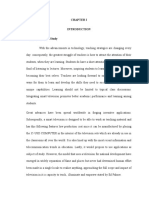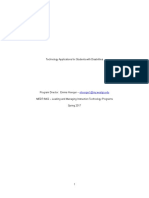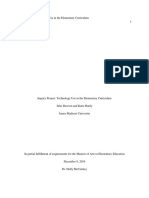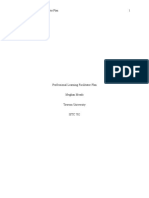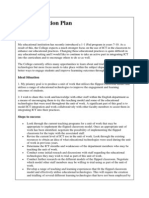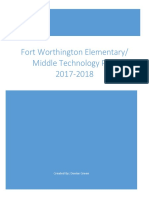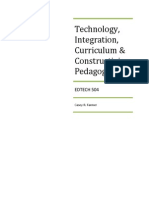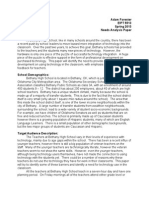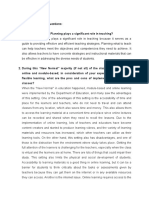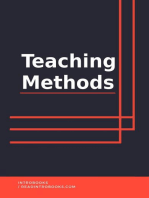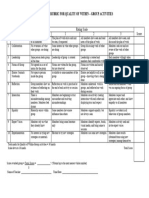Ambar Xii-P4
Ambar Xii-P4
Uploaded by
tahafeCopyright:
Available Formats
Ambar Xii-P4
Ambar Xii-P4
Uploaded by
tahafeOriginal Description:
Original Title
Copyright
Available Formats
Share this document
Did you find this document useful?
Is this content inappropriate?
Copyright:
Available Formats
Ambar Xii-P4
Ambar Xii-P4
Uploaded by
tahafeCopyright:
Available Formats
Name : Ambar Wardah Hasan
Class/no abs : XII-P4/04
Pros and Cons of Curriculum 2013
Curriculum 2013 started to be implented on the school academic year 2013/2014.
Although it has been officially used but the latest curriculum is still still raising the pros and cons among
educational practitioners.
Those who support it state that Curriculum 2013 is actually aiming to solidify the lessons so
it does not burden the students. As a result, students will focus on the challenges of the future of the
nation. So also with the teachers, they are not burdened in the preparation of the Education Unit Level
Curriculum.
Further Curriculum 2013 itself is actually not something new. Curriculum 2013 is a
combination of two kinds of earlier educational curriculum in Indonesia; CBSA (active student learning)
and KTSP (education level curriculum). It is very advategeous as CBSA teaches students to be critical.
Conversely, those who do not agree with Curriculum 2013 state the new curriculum is less
focus because it combines the learning subjects. In primary school it combines science subjects with
Indonesian. According to them combining two subjects into one material may not be effective as it does
not consider teacher’s competences in most of schools in different regions in Indonesia.
Some parents also do not aggree with Curriculum 2013 as they still want that English is
given to students from primary school. They argue that mastering foreign language need long time and
prcess and it is good if statred from earlier. They added that many sources of common knowledges is
written in foreign language, especially English.
The reason for the application of Curriculum 2013 also does not have a strong foundation.
There is no in-depth study of the causes of the failure of previous curriculum which makes it to be
replaced with the new one
Finally the pros and cons are always there. Curriculum 2013 has been already
implemented. Will this new curriculum successfully lead education in Indonesia to move forward? We’re
all going to see it.
Paragraph 1 Stating issue – The implementation of Curriculum 2013
Paragraph 2 & 3 Supporting arguments
– Curriculum 2013 is aiming to solidify the lessons
– Curriculum 2013 is a combination of two kinds of earlier educational curriculum in Indonesia
paragraph 4, 5, dan 6 Against Arguments
– the new curriculum is less focus
– they still want that English is given to students from primary school
– application of Curriculum 2013 also does not have a strong foundation.
paragraph 7 Conclussion /Recommendation
– pros and cons are always there, dst
THE BENEFITS OF TECHNOLOGY IMPLEMENTATION IN EDUCATION
Basically, technology is created to ease humans’ work. Nowadays technology has become the
primary needs of humans. Even technology has been used in all aspects of human life, such as in the
fields of medicine, communications, military, transportation and education. From those various fields,
the implementation of technology in education is still very limited. In reality, the implementation of
technology is more widely used in the field of entertainment. This utilization would have actually cause a
lot of problems such as abuse and harm to the health. Nevertheless, if implemented in education,
technology can assist and accelerate educational purposes. Here are some advantages of the application
of technology in education.
Technology can help teachers teach
It can be a tool for teachers to convey their teaching materials to students. With the use of technology
in the learning process, teachers can deliver course material with very easy and effective. Teachers who
teach will be easier to achieve learning goals, if using technology.
Technology will spark teachers’ creativity
It can create creativity sense of teachers. They can be more creative in creating teaching methods. With
it, they will be encouraged to be creative because the technology is just a tool that requires a person to
operate it. If without teachers, technology will not affect in education optimally.
Technology helps students learn
Implementation of technology in teaching and learning will make students more interested in following
lessons. If students had interested in what the teacher taught, it is not necessary to ask students to be
serious in learning. Students will be active automatically and will not feel the boredom due to learning.
Technology can create exciting learning activities
With the technology teachers can create exciting learning atmosphere. It is very good to trigger the
students’ understanding in learning so that they will understand quickly what is conveyed by the
teacher. In addition, the students also will not feel bored because they would love to learn with learning
methods that is interesting. If students excited learning, their grades would have increase in some
subjects that are usually considered difficult like maths, bhs. English, etc.
Make students easy to find source of learning
Technology information especially internet, provides a wide range of learning resources that can be
accessed by students anytime and anywhere. They can get all the references that they need for free.
The more they learned from different sources, the smarter students will be.
Technology can raise school standards
Schools which are using technology in the teaching process will improve their quality. The school will be
favorite school and become a destination for students to study at the school.
Technology makes students have wide insight
If Students had use the technology properly will have extensive knowledge. Even they can be active in
the international forums of communication that can train them to be proactive students.
Based on the discussion above, it can be concluded that the technology is very useful in education
world especially good for teachers, students and schools. Therefore education practitioners should use
technology in education.
If without teachers, technology will not affect in education optimally(type 1)
fact: without teachers might technology not affect in education
If students had interested in what the teacher taught, it is not necessary to ask students to be serious in
learning. (type 2)
fact: students have not interested in what the teacher taught, so it is necessary to ask students to be
serious in learning
If students excited learning, their grades would have increase in some subjects that are usually
considered difficult like maths, bhs. English, etc. (type 3)
fact : students didn’t excited learning so their grades didn’t increase in some subjects that are usually
considered difficult like maths, bhs. English, etc.
You might also like
- Tiered Lesson PlanDocument7 pagesTiered Lesson PlanDomagoj Bosn100% (3)
- Impact of The Anti-Intellectual Attitudes To The Level of Self-Esteem of Senior High School Students From Fiat Lux Academe-Cavite, PhilippinesDocument15 pagesImpact of The Anti-Intellectual Attitudes To The Level of Self-Esteem of Senior High School Students From Fiat Lux Academe-Cavite, PhilippinesLee NicoNo ratings yet
- Eit 311Document16 pagesEit 311Peter TingNo ratings yet
- Law & Public Safety Lesson PlanDocument6 pagesLaw & Public Safety Lesson Planapi-285921599100% (1)
- An Innovative Work PlanDocument10 pagesAn Innovative Work PlanPrincess May Geronimo ParaynoNo ratings yet
- My Personal Philosophy of Technology in EducationDocument6 pagesMy Personal Philosophy of Technology in Educationapi-302902726100% (6)
- Recognition Day ScriptDocument6 pagesRecognition Day ScriptKemberly Semaña Penton100% (2)
- Teaching Writing Using Google Apps For Education (GAFE) : Afrianto DaudDocument8 pagesTeaching Writing Using Google Apps For Education (GAFE) : Afrianto DaudVeta PougaridouNo ratings yet
- Position Paper About Learner-Centered TeachingDocument7 pagesPosition Paper About Learner-Centered TeachingKyla GaonNo ratings yet
- Teacher Perspective On The Use of Blended Learning To Assess Students' Speaking SkillDocument5 pagesTeacher Perspective On The Use of Blended Learning To Assess Students' Speaking SkillKadek MahendraNo ratings yet
- Thesis... Research SampleDocument69 pagesThesis... Research SampleAletheia Annaliese LamperougeNo ratings yet
- Research JundleDocument14 pagesResearch JundleLea SantueleNo ratings yet
- Article ReviewDocument9 pagesArticle Reviewapi-274337450No ratings yet
- Chapter I Was Pa Tawn NahumanDocument9 pagesChapter I Was Pa Tawn NahumanRascel SumalinogNo ratings yet
- Final Kimberly Mccarthy Portfolio Part 2Document24 pagesFinal Kimberly Mccarthy Portfolio Part 2api-727976987No ratings yet
- Oke Oktaviana Putri - 21202241089 - EIT Midterm ESSAY Test 2023Document3 pagesOke Oktaviana Putri - 21202241089 - EIT Midterm ESSAY Test 2023keke tokNo ratings yet
- The Problem and Its ScopeDocument68 pagesThe Problem and Its ScopeRebecca CaponongNo ratings yet
- Educational Technology For Inclusive Classroom Sumana PaulDocument10 pagesEducational Technology For Inclusive Classroom Sumana PaulAnonymous CwJeBCAXpNo ratings yet
- Research Proposal TranslationDocument10 pagesResearch Proposal TranslationNada VidyaNo ratings yet
- Skripsi Chapter 1-5 PinkanDocument56 pagesSkripsi Chapter 1-5 PinkanEkaputrilestari 3007No ratings yet
- Action Research Proposal - DocsDocument14 pagesAction Research Proposal - DocsJohnson Fernandez100% (1)
- Inclusion in The 21st-Century Classroom: Differentiating With TechnologyDocument14 pagesInclusion in The 21st-Century Classroom: Differentiating With TechnologyLisa TalNo ratings yet
- 806 ExtensivereadingDocument16 pages806 Extensivereadingapi-385378934No ratings yet
- One-to-One Classrooms 1 Running Head: ONE-TO-ONE CLASSROOMSDocument12 pagesOne-to-One Classrooms 1 Running Head: ONE-TO-ONE CLASSROOMSLee Ann Livesay PattersonNo ratings yet
- Exam in Educational TechnologyDocument2 pagesExam in Educational TechnologyMaRvz Nonat MontelibanoNo ratings yet
- Article TranslationDocument10 pagesArticle TranslationNada VidyaNo ratings yet
- Nurul Huda, Research Proposal Seminar Paper Do5216028Document9 pagesNurul Huda, Research Proposal Seminar Paper Do5216028Dee Id-StoreNo ratings yet
- How Instructional Design Principles and Theory Influence The Use of TechnologyDocument6 pagesHow Instructional Design Principles and Theory Influence The Use of Technologyapi-277853352No ratings yet
- 8462 Hoerger GrantproposalDocument25 pages8462 Hoerger Grantproposalapi-309801450No ratings yet
- Ecc412 Noorasyikinahmad E30109130036Document26 pagesEcc412 Noorasyikinahmad E30109130036teacherasyikinNo ratings yet
- Curriculumk 12 Interview 1 1Document2 pagesCurriculumk 12 Interview 1 1WAYNE STONENo ratings yet
- Policy Change in The Curriculum in Indonesia 2016Document11 pagesPolicy Change in The Curriculum in Indonesia 2016HepriyadiNo ratings yet
- Learning and Teaching Strategies Preferences of Btled Students During The New Normal of EducationDocument26 pagesLearning and Teaching Strategies Preferences of Btled Students During The New Normal of EducationKen Dela ChinaNo ratings yet
- Muller-Technology Teaching PhilosophyDocument5 pagesMuller-Technology Teaching Philosophyapi-283697766No ratings yet
- Inquiry ProjectDocument31 pagesInquiry Projectapi-279556324No ratings yet
- Educational TechnologyDocument7 pagesEducational TechnologyMarie Ann Toong QuicoNo ratings yet
- Taxonomy of Educational ObjectivesDocument5 pagesTaxonomy of Educational Objectiveslalaine reginaldo100% (1)
- Professional Learning Facilitator PlanDocument13 pagesProfessional Learning Facilitator Planapi-485411718No ratings yet
- Using Instructional Technology As Media in EnglishDocument14 pagesUsing Instructional Technology As Media in EnglishJungfera 1805No ratings yet
- Research Proposal Research TitleDocument6 pagesResearch Proposal Research TitleMaya BabaoNo ratings yet
- Technology in Teaching EnglishDocument16 pagesTechnology in Teaching EnglishElisa HairaniNo ratings yet
- Raymar RadamDocument3 pagesRaymar RadamRolando Corado Rama Gomez Jr.No ratings yet
- Uas Textbooks - Karin Ayu AngrainiDocument7 pagesUas Textbooks - Karin Ayu AngrainiHabibi Oppo92No ratings yet
- Emt501 Task 1 Action PlanDocument5 pagesEmt501 Task 1 Action Planapi-238497149No ratings yet
- Proposal Nur Azizah 2315059 R1Document34 pagesProposal Nur Azizah 2315059 R1zizieNo ratings yet
- 1 Chapter 1 Lesson StudyDocument10 pages1 Chapter 1 Lesson StudyRon YongNo ratings yet
- Technology IntegrationDocument8 pagesTechnology Integrationapi-356578877No ratings yet
- Dindugul Seminar PaperDocument6 pagesDindugul Seminar PaperJP Raj AmulNo ratings yet
- Mercado, Aimee Korine - Chapter 1-3Document22 pagesMercado, Aimee Korine - Chapter 1-3Aimee KorineNo ratings yet
- Research Paper TemplateDocument4 pagesResearch Paper Templateapi-302422262No ratings yet
- Fort Worthington Elementary/ Middle Technology Plan 2017-2018Document15 pagesFort Worthington Elementary/ Middle Technology Plan 2017-2018api-315122636No ratings yet
- Discussion TextDocument2 pagesDiscussion TextNadya Mutiarani100% (1)
- Farmer C 2014 PaperDocument16 pagesFarmer C 2014 PapercaseyfarmerNo ratings yet
- The Implementation of Curriculum 2013Document9 pagesThe Implementation of Curriculum 2013Steffi Whynstelle QuonNo ratings yet
- I - Search Implementation of The Technology For Education in IndonesiaDocument2 pagesI - Search Implementation of The Technology For Education in IndonesiaSubkhan KholiqiNo ratings yet
- Needs Analysis PaperDocument4 pagesNeeds Analysis Paperapi-117712576No ratings yet
- EA02 1st Batch 2nd Sem AY2022 2023Document3 pagesEA02 1st Batch 2nd Sem AY2022 2023Aira Dela CruzNo ratings yet
- The ProblemDocument4 pagesThe ProblemPrinces Jane VelascoNo ratings yet
- CHAPTER ASSESSMENTS MODULE 4 LESSONS 1 To 4Document3 pagesCHAPTER ASSESSMENTS MODULE 4 LESSONS 1 To 4anjeilinne mae BocalaNo ratings yet
- Things To REMEMBERDocument6 pagesThings To REMEMBERPi XuNo ratings yet
- The Use of Technology and Blended Learning To Alter Response To InterventionDocument7 pagesThe Use of Technology and Blended Learning To Alter Response To Interventionapi-427654873No ratings yet
- The Future of Education: Innovations in Learning and TeachingFrom EverandThe Future of Education: Innovations in Learning and TeachingNo ratings yet
- Final Coaching BulletsDocument3 pagesFinal Coaching BulletsJulie Ann GinesNo ratings yet
- High School Graduation Speech: "Education Is The Key To Open The World, A Passport To Freedom." Oprah WinfreyDocument2 pagesHigh School Graduation Speech: "Education Is The Key To Open The World, A Passport To Freedom." Oprah WinfreyJavier Marquez HurtadoNo ratings yet
- Ancient Indian History Introduction ClassDocument12 pagesAncient Indian History Introduction ClassNithin SamalaNo ratings yet
- Present Continous Unit 1 Lesson PlanDocument2 pagesPresent Continous Unit 1 Lesson PlanEman MostafaNo ratings yet
- Effective Communication in A Diverse Workplace: Ritu RanaDocument5 pagesEffective Communication in A Diverse Workplace: Ritu RanahouseNo ratings yet
- Q6Document3 pagesQ6sheinadom2007yNo ratings yet
- Public Financing For UHC OctNov LoP FINALDocument14 pagesPublic Financing For UHC OctNov LoP FINALsyaiful rinantoNo ratings yet
- Peran Orang Tua Dalam Meningkatkan Minat Baca Anak TK Di Kecamatan Pulung Nita AnggrainiDocument13 pagesPeran Orang Tua Dalam Meningkatkan Minat Baca Anak TK Di Kecamatan Pulung Nita AnggrainiRintasari HalawaNo ratings yet
- 1.1: Displaying and Describing Categorical Data: Number of Class Periods: Essential QuestionsDocument4 pages1.1: Displaying and Describing Categorical Data: Number of Class Periods: Essential Questionsapi-261949370No ratings yet
- Self-Learning Module Science3Document13 pagesSelf-Learning Module Science3Torres, Emery D.No ratings yet
- Mary As A DiscipleDocument1 pageMary As A Discipleapi-304591081No ratings yet
- EC - - 34360 - 教學計畫Document3 pagesEC - - 34360 - 教學計畫余思懷No ratings yet
- Bourdieu TasteDocument387 pagesBourdieu TasteMarco PogacnikNo ratings yet
- Financial Literacy Survey ResultsDocument10 pagesFinancial Literacy Survey Resultsapi-544823815No ratings yet
- 07092015maud RT579Document3 pages07092015maud RT579Raghu RamNo ratings yet
- Brenda Huffstutler, MSW - ResumeDocument2 pagesBrenda Huffstutler, MSW - ResumenaleolanigalNo ratings yet
- Test-20.01.21 13.30Document18 pagesTest-20.01.21 13.30Vidushee JeerakunNo ratings yet
- Review PaperDocument13 pagesReview Paperswati jainNo ratings yet
- English Grade5 Rmya Most and Least Learned 2022 2023Document3 pagesEnglish Grade5 Rmya Most and Least Learned 2022 2023Mailah Victoria AmuraoNo ratings yet
- Y-A-L-L-, AXXX XXX 594 (BIA Oct. 29, 2015)Document6 pagesY-A-L-L-, AXXX XXX 594 (BIA Oct. 29, 2015)Immigrant & Refugee Appellate Center, LLCNo ratings yet
- Gr. 1 Star WHLP q4 Week1Document13 pagesGr. 1 Star WHLP q4 Week1Gemma Lyn Dungo SungaNo ratings yet
- C. Scoring Rubric For Quality of Within - Group ActivitiesDocument1 pageC. Scoring Rubric For Quality of Within - Group Activitiesbechamrocky35No ratings yet
- Proportional Reasoning - Part WholeDocument8 pagesProportional Reasoning - Part WholelanastarrNo ratings yet
- Covid-19 Pneumonia Classification Using Deep Learning TechniqueDocument20 pagesCovid-19 Pneumonia Classification Using Deep Learning TechniqueJilly Arasu100% (1)
- Latihan Soal Up Pedagogi Dan Profesional Bhs InggrisDocument28 pagesLatihan Soal Up Pedagogi Dan Profesional Bhs InggrisSusmi Wibowo100% (1)
- (Sport in The Global Society) C. Richard King - Native Americans and Sport in North America - Other People's Games-Routledge (2007)Document221 pages(Sport in The Global Society) C. Richard King - Native Americans and Sport in North America - Other People's Games-Routledge (2007)Juan David MorenoNo ratings yet
- Kryterion Testing Network Quick Reference and Troubleshooting GuideDocument1 pageKryterion Testing Network Quick Reference and Troubleshooting Guidesestidavide.mailNo ratings yet













